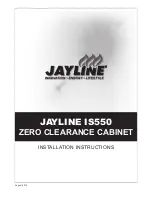
Stratford
Fireplace Installation and Operation Manual
76 __________________________________________________________________________
APPENDIX 4: INSTALLING THE FRESH AIR INTAKE KIT
During operation, the fireplace requires fresh air for combustion and draws air out of the house. It may
starve other fuel burning appliances such as gas or oil furnaces. As well, exhaust fans may compete for air,
causing negative pressure in the house, resulting in smoke entering the house from the fireplace. This
situation is aggravated in modern airtight houses. To overcome this problem, we strongly recommend that
you bring fresh air to the fireplace.
Check with local authorities having jurisdiction in your area, it may be
mandatory.
If more fresh air is needed (airtight house or conduit exceeding 10 ft. or 3 m), two intakes may be installed,
providing twice the quantity of incoming fresh air; you may also increase both conduits to 4 inches, with
the use of a 3 to 4-inch adaptor, again increasing substantially the quantity of incoming fresh air.
THE INSULATED FLEXIBLE PIPE LENGTH SHOULD BE SUFFICIENT AND HAVE A CONFIGURATION TO AVOID
CONDENSATION.
THE OUTSIDE WALL TERMINATION MUST NOT BE INSTALLED AT MORE THAN 50% OF THE TOTAL HIGHT
OF THE CHIMNEY AND AT THE MOST 10 FT. (3 M) ABOVE THE BASE OF THE FIREPLACE.
THE FRESH AIR MUST COME FROM OUTSIDE THE HOUSE. THE AIR INTAKE MUST NOT DRAW AIR FROM
THE ATTIC, FROM THE BASEMENT, OR FROM A GARAGE.
THE OUTSIDE WALL TERMINATION SHOULD BE INSTALLED WHERE IT IS NOT LIKELY TO BE BLOCKED BY
SNOW OR EXPOSED TO EXTREME WIND AND AWAY FROM AUTOMOBILE EXHAUST FUMES, GAS METER
AND OTHER VENTS.
The fresh air intake kit included with the fireplace contains the following components:
a.
One (1) 3" adaptor;
b.
One (1) air inlet block-off plate;
c.
Six (6) screws;
d.
One (1) 3” to 4” adaptor.
The following component is not included:
a.
The outside air inlet cap;
b.
The 2 adjustable straps;
c.
A 3" or 4" insulated flexible pipe (This HVAC type pipe must comply to ULC S110 and/or UL 181,
Class 0 or Class 1 Standards and must withstand temperatures up to 250 °F.















































